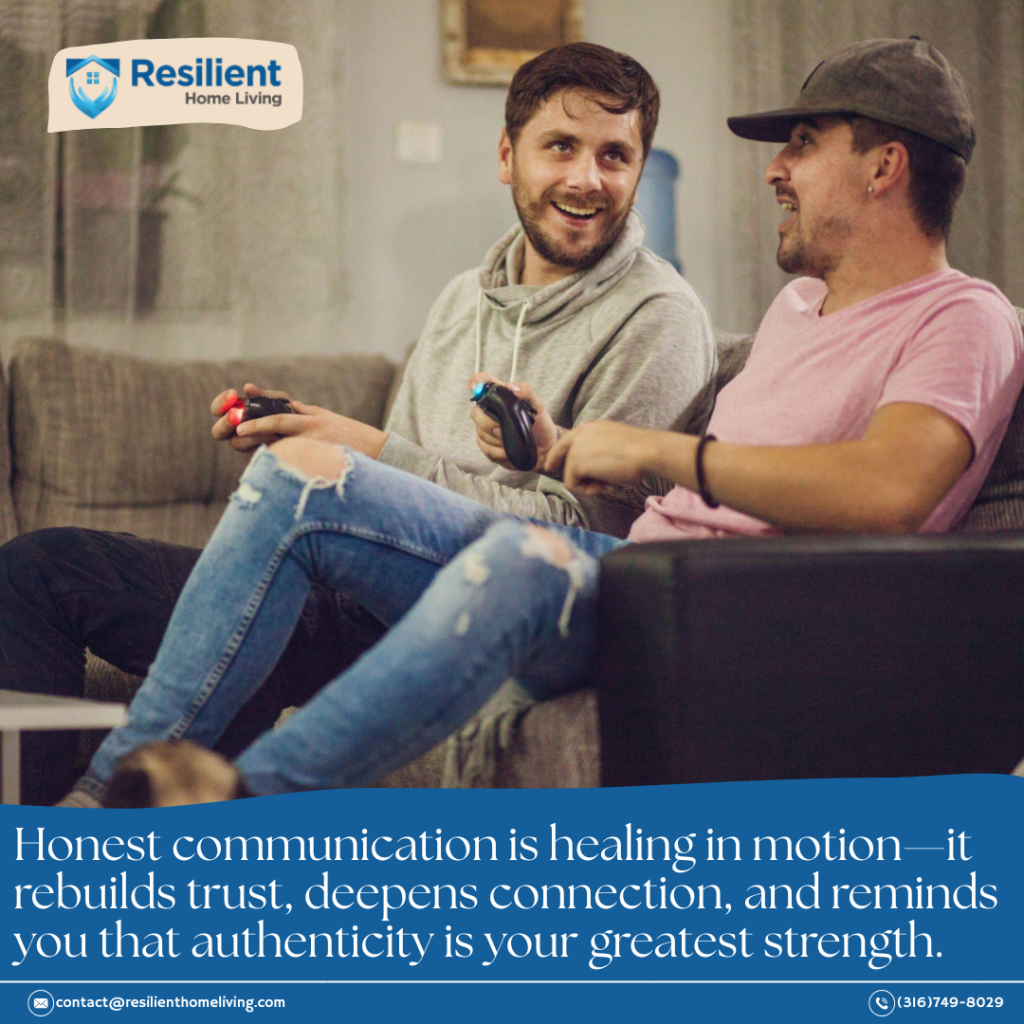(Approx. 1,600 words)
One of the most powerful—and sometimes most uncomfortable—parts of recovery is learning how to communicate honestly.
For years, addiction may have relied on avoidance, denial, or half-truths to survive. You might’ve told others (and yourself) that everything was fine when it wasn’t, or that you had control when things were spiraling. But recovery invites something radically different: honesty.
Communicating with truth isn’t just about being “open” with others—it’s about reconnecting with yourself. It’s about learning how to speak your truth, express your needs, and listen with empathy. And that skill changes everything.
🌱 Why Honest Communication Matters in Recovery
When you enter sobriety, honesty becomes a cornerstone of healing. Without it, trust can’t be rebuilt—with loved ones or yourself. Honest communication helps you:
- Rebuild relationships that may have been damaged by secrecy or broken trust.
- Understand your emotions and express them clearly instead of suppressing them.
- Set healthy boundaries that protect your peace and prevent relapse.
- Stay accountable to your goals, values, and progress.
When you communicate truthfully, you create safety—not just for others, but for your own emotional growth.
💬 The Barriers to Honest Communication
Let’s be real—being honest can feel terrifying, especially if you’re used to hiding pain or conflict. Common barriers include:
- Fear of rejection or judgment. You might worry others won’t understand or will leave.
- Guilt and shame. Past actions can make it hard to speak up or admit mistakes.
- People-pleasing. Saying what others want to hear may feel safer than speaking your truth.
- Emotional overload. If you’ve spent years avoiding your feelings, it can be overwhelming to express them openly.
The key to breaking through these barriers is patience and self-compassion. Recovery communication is a skill—and like all skills, it’s learned with practice, not perfection.
🌿 Step 1: Practice Honest Self-Reflection
Before you can be honest with others, you must first be honest with yourself. Ask:
- What emotions am I feeling right now?
- Am I speaking from truth or fear?
- What do I really want to say?
Journaling can help uncover what’s really going on beneath the surface. When you understand your emotions, it’s easier to express them in healthy, authentic ways.
🗣️ Step 2: Speak with Vulnerability, Not Defensiveness
Vulnerability isn’t weakness—it’s courage in motion. When you express how you feel without blame or walls, you invite real connection.
Try using “I” statements:
- “I feel anxious when plans change suddenly.”
- “I need more time to process my emotions.”
- “I’m struggling today and need support.”
These statements focus on your feelings and needs without putting others on the defensive. They open the door to understanding rather than argument.
❤️ Step 3: Learn to Listen, Not Just Speak
Honest communication is a two-way street. Listening with empathy builds trust and strengthens relationships.
Instead of planning your response while someone else is speaking, try to really hear them. Reflect what you hear:
“It sounds like you’re feeling frustrated because I haven’t been present.”
When you listen without trying to fix or control, people feel seen—and that builds genuine connection.
💡 Step 4: Rebuild Trust Through Consistency
Trust doesn’t rebuild overnight. It grows when your words and actions align—again and again. Be honest about your progress and your challenges. If you make a mistake, own it and make amends quickly.
Consistency is the quiet language of trust. Over time, loved ones will feel safe opening up to you again because they see you showing up honestly.
🧘♀️ Step 5: Communicate to Connect, Not Control
Addiction often thrives on manipulation—bending the truth to get what you want or avoid consequences. Recovery replaces that with transparency.
Communicating to connect means expressing your truth without trying to shape someone else’s reaction. You speak honestly because it’s the right thing to do, not because you’re seeking approval or control. That’s real emotional freedom.
🌻 Step 6: Embrace Discomfort as Growth
Sometimes, honesty will feel awkward or even painful. That’s okay—it means you’re growing. Every time you have a difficult but honest conversation, you’re strengthening your emotional muscles.
Remember: uncomfortable conversations often lead to deep healing. Whether it’s admitting you’re struggling, setting a boundary, or expressing your needs, each moment of honesty brings you closer to peace.
💬 Step 7: Seek Support for Honest Expression
If you struggle to communicate, you’re not alone. Many people in recovery work with therapists, sponsors, or peer groups to learn how to express themselves honestly. Safe spaces allow you to practice vulnerability without fear of judgment.
Over time, you’ll find your voice—and you’ll trust it.
🌈 Final Thoughts: The Freedom of Truth
Honest communication is the heartbeat of lasting recovery. It builds trust, deepens relationships, and helps you stay grounded in who you really are.
When you speak with truth and kindness, you free yourself from the burden of pretending. You stop performing—and start connecting.
You don’t have to have the perfect words. Just have honest ones.

